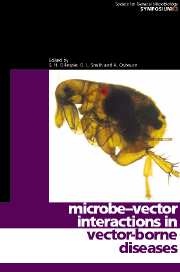Book contents
- Frontmatter
- Contents
- Contributors
- Editors' Preface
- 1 Vector-borne diseases
- 2 Evolution of tick-borne disease systems
- 3 Insect transmission of viruses
- 4 RNA-based immunity in insects
- 5 Specificity of Borrelia–tick vector relationships
- 6 Bunyavirus/mosquito interactions
- 7 How do mosquito vectors live with their viruses?
- 9 Vector competence
- 9 Environmental influences on arbovirus infections and vectors
- 10 Vector immunity
- 11 Transmission of plant viruses by nematodes
- 12 Wolbachia host–symbiont interactions
- 13 Pathogenic strategies of Anaplasma phagocytophilum, a unique bacterium that colonizes neutrophils
- 14 Interactions of Yersinia pestis with its flea vector that lead to the transmission of plague
- 15 Transgenic malaria
- 16 Vaccines targeting vectors
- Index
7 - How do mosquito vectors live with their viruses?
Published online by Cambridge University Press: 06 July 2010
- Frontmatter
- Contents
- Contributors
- Editors' Preface
- 1 Vector-borne diseases
- 2 Evolution of tick-borne disease systems
- 3 Insect transmission of viruses
- 4 RNA-based immunity in insects
- 5 Specificity of Borrelia–tick vector relationships
- 6 Bunyavirus/mosquito interactions
- 7 How do mosquito vectors live with their viruses?
- 9 Vector competence
- 9 Environmental influences on arbovirus infections and vectors
- 10 Vector immunity
- 11 Transmission of plant viruses by nematodes
- 12 Wolbachia host–symbiont interactions
- 13 Pathogenic strategies of Anaplasma phagocytophilum, a unique bacterium that colonizes neutrophils
- 14 Interactions of Yersinia pestis with its flea vector that lead to the transmission of plague
- 15 Transgenic malaria
- 16 Vaccines targeting vectors
- Index
Summary
INTRODUCTION
The word vector is derived from the Latin and means ‘bearer’ or ‘one who does something’, but for the purposes of this chapter, we can use the term as defined by Gordh & Headrick (2001) as an arthropod that carries disease-producing organisms to a vertebrate host. A wide variety of arthropods are involved as vectors in pathogen transmission cycles but the focus of this chapter is the mosquito. To date, there are at least 537 named arthropod-borne viruses (arboviruses) (Karabatsos, 1985), encompassing species from many genera, examples of which are given in Table 1. With one exception (African swine fever virus, transmitted by ticks) all of the viruses regarded as true arboviruses have an RNA genome. The vast majority of arboviruses (e.g. Togaviridae, Flaviviridae, Bunyaviridae) are enveloped, i.e. the nucleocapsid is surrounded by a lipid-containing envelope. A few (e.g. Reoviridae) are non-enveloped. Most of these (e.g. bluetongue virus and Colorado tick fever virus) are transmitted by midges and ticks. Fewer than 20 have been isolated from mosquitoes and only lebombo and Orungo have been associated with human infections. As discussed by Mitchell (1983), because arboviruses are typically not pathogenic to their insect hosts, it has been hypothesized that they may have evolved in insects and later became infectious to vertebrates. Tick-borne arboviruses (see review by Nuttall & Labuda, 2003) and the true insect viruses (e.g. nuclear polyhedrosis viruses) that infect and replicate in mosquitoes, but are not transmitted to vertebrate hosts (Miller & Ball, 1998), are not considered in this chapter. Given that almost all mosquito-borne viruses are enveloped and have an RNA genome, unless specified otherwise, this review therefore focuses on this predominant group of arboviruses.
- Type
- Chapter
- Information
- Microbe-vector Interactions in Vector-borne Diseases , pp. 103 - 138Publisher: Cambridge University PressPrint publication year: 2004
- 9
- Cited by



